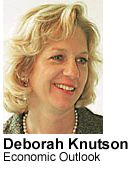 |
|
|
YOUR
COUNTY.
|
YOUR
BUSINESS JOURNAL.
|
Published January 2001
Planning
for future
a priority across county
 While
the campaign to raise awareness of economic development in Snohomish County
continues, many municipalities and regional interests are joining the
effort to ensure their voices are heard as well.
While
the campaign to raise awareness of economic development in Snohomish County
continues, many municipalities and regional interests are joining the
effort to ensure their voices are heard as well.
At year’s end, more than $2 million had been pledged toward the ultimate $3.5 million investment goal to make the county’s Economic Development Council competitive in attracting family-wage employers here. The campaign will continue through much of this year.
Meanwhile, economic development is emerging as an important issue in many cities, towns and regions throughout the county as civic leaders and citizens consider how to place their own specific “stamp” on future development in their communities.
These entities have their own unique cultural identities that may call for future development that has a natural “fit” with existing neighborhoods. What may be the economic development vision in say, Lynnwood, may be far different than that in the city of Snohomish, for instance, and rightly so.
Among the most energetic localized economic and community development efforts centers on the activities of the North County Summit, a coalition of communities and business interests. North-countians recognize that the abundance of available land for development makes the region much different from south county entities and what they can offer.
In north county, land-use and development issues become of paramount importance, while in Lynnwood, for instance, debating how to encourage the building of additional high-rise structures may be of most interest.
In Snohomish, City Planner Ann Caley and other government leaders are well aware that the uniqueness of the city’s famed Historic District could limit the type and size of a business interested in moving there; however, it also serves as a great attraction to businesses seeking that unique ambience. In contrast, the Bickford Avenue corridor with its emerging “industrialization” look may be attractive to companies specializing in light assembly or manufacturing.
The picture of future development in Snohomish has been the subject of community “charettes,” meetings of a variety of community stakeholders where the assembled group breaks into smaller discussion gatherings to discuss a common topic.
In Everett, the recent debate over whether the Snohomish County government should move to a facility near Boeing renewed attention on the future of downtown development. At present, the vacancy rate in downtown Everett is estimated at 17.7 percent, the highest rate among the regional submarkets in the east portion of Puget Sound.
Most of the vacant space is found in older, so-called Class “B” office buildings and stores. The more modern Class “A” office space downtown, such as the 145,000-square-foot Everett Mutual Tower, has vacancy rates in the low single digits.
In recognition of the importance of the issue, the city has appointed Lanie McMullan to lead the economic development effort at City Hall.
The discussion of economic development in downtown Everett, especially in light of the anticipated December 2001 opening of the nearby competitive Everett Transit Center, is expected to receive much attention this year.
The future “look” of Lynnwood’s business district continues as a spirited discussion topic. Will Lynnwood eventually emerge as Snohomish County’s high-rise center, much as Bellevue has on the Eastside?
In addition, the county is looking at “urban centers,” areas designated for higher densities and more mixed-use development options. Due to locations on freeways and mass transit routes, these centers can serve much of our anticipated growth opportunities.
The eastern portion of Snohomish County also is alive with interest in economic development. In Sultan, plans continue to establish zoning and infrastructure upgrades to support development of a business park that could house many light-manufacturing facilities ranging from 5,000 to 100,000 square feet. Similar plans are being considered for a business park in Monroe, as well.
I applaud and support discussion of all of these community economic development efforts. The more everybody talks about how our communities will “look” and “function” in the future, the better off we all will be in Snohomish County.
Deborah Knutson is President of the Snohomish County Economic Development Council. She can be reached at 425-743-4567 or by e-mail to dknutson@snoedc.org.
© The Daily Herald Co., Everett, WA








